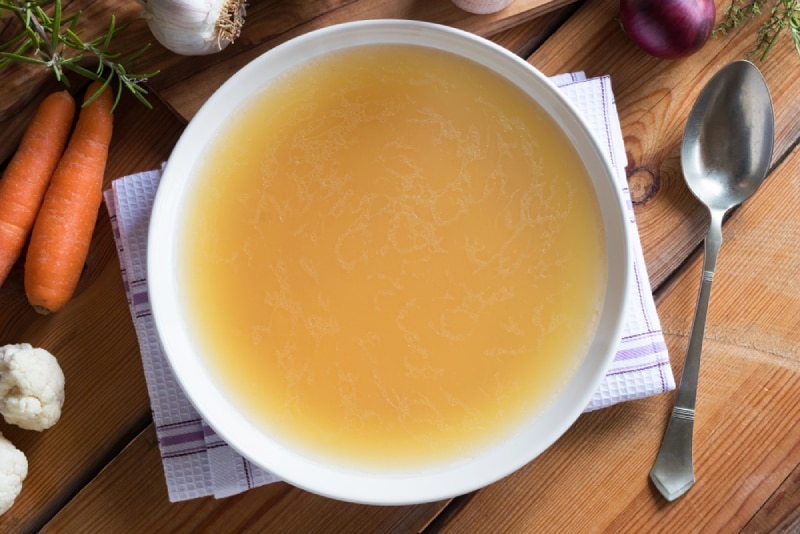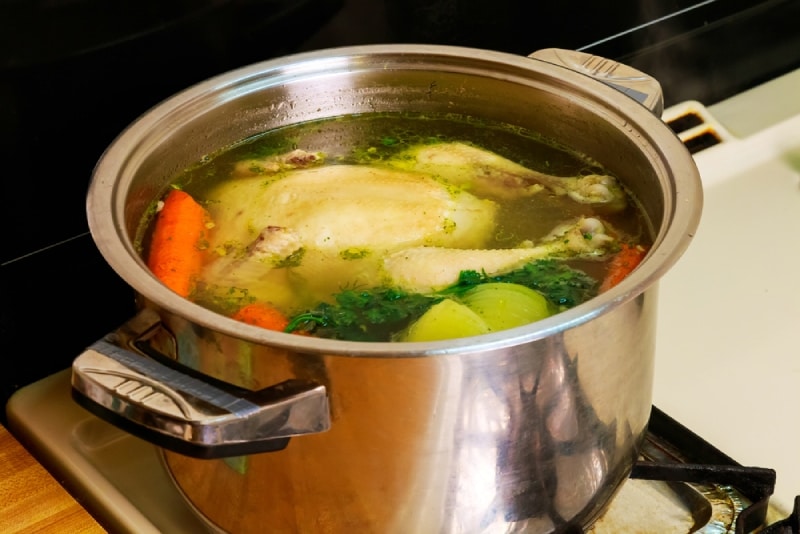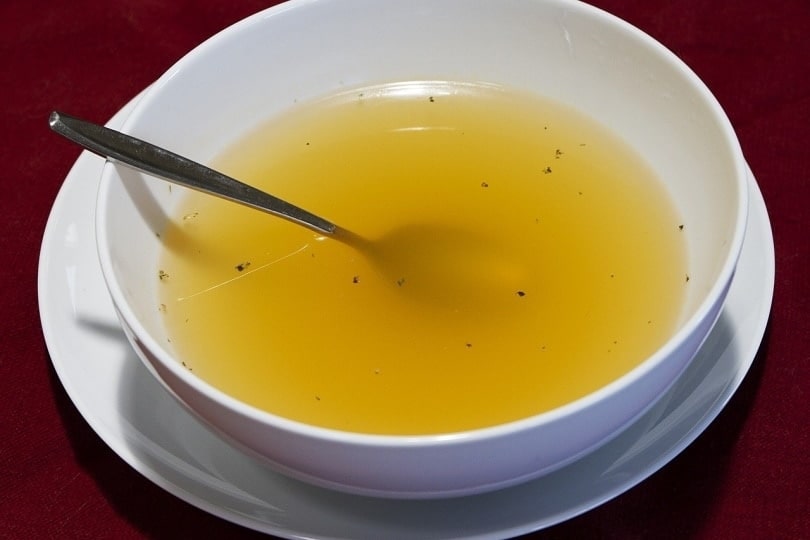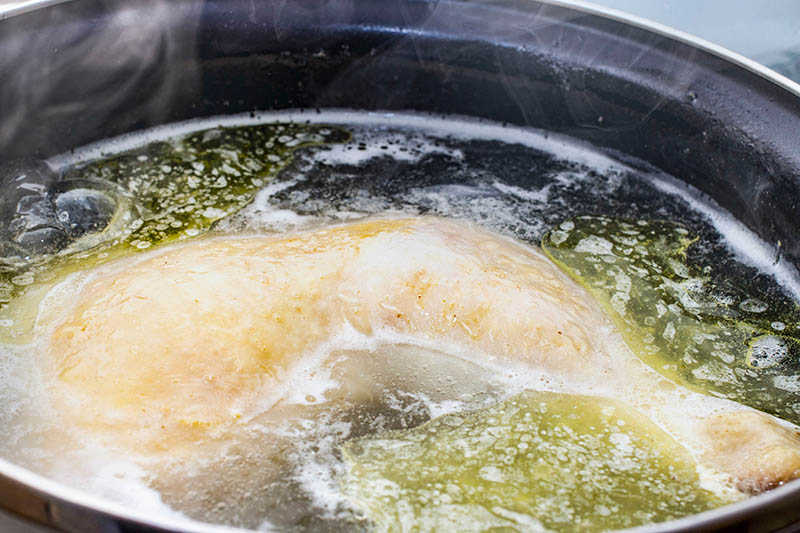Many people struggle with getting their cats to drink enough water, and since they can eat chicken, you might wonder if chicken broth can be a good way to keep them hydrated. Fortunately, chicken broth is safe for cats if you make it fresh, though there can be several dangers if you purchase it at the store. Here, we discuss the possible benefits and risks of feeding chicken broth to your cat.

What Is Chicken Broth?
Chicken broth is a flavorful liquid typically made by simmering portions of chicken in water. It’s often used as a base for soups, stews, sauces, and other dishes. Making chicken broth involves slowly cooking the chicken and vegetables to extract their flavors, nutrients, and overall essence. Simmering can last several hours, which means the flavors and nutrients can infuse the liquid. When everything finishes cooking, the whole batch goes through a strainer to remove the solid ingredients, leaving behind a clear liquid.

Benefits of Chicken Broth for Cats
Hydration
Cats are notorious for having low thirst drives, which can put them at risk of urinary issues, particularly if they only consume a dry kibble diet. As an occasional treat, chicken broth may encourage increased fluid intake, promoting proper hydration.
Appetite Stimulation
Cats can be picky eaters, resisting change and refusing to try new foods. Some may even lose interest in their current food due to illness, stress, or other factors, so the aroma and taste of chicken broth might entice a reluctant cat to eat.
Detox
Chicken broth contains the amino acid glycine, the main ingredient in collagen. It’s responsible for many health benefits in other species, including improved coat and joint health, and provides antioxidants.

Risks of Chicken Broth for Cats
Sodium Content
Store-bought chicken broth can be high in sodium, which is unsuitable for cats. Excessive sodium intake can lead to dehydration and other health issues. Choose low-sodium or homemade versions when possible.

Onion and Garlic
Some chicken broths contain onions and garlic, which are toxic to cats. These ingredients can lead to an upset digestive system, anemia, and other serious health problems. Always read the label before giving chicken broth to your cat to ensure that there are no garlic or onions.
Allergies
Cats can have allergies or sensitivities to certain ingredients. Monitor your cat for signs of an allergic reaction after they consume chicken broth, such as vomiting, diarrhea, or skin issues, and consult a veterinarian immediately if you notice any.

Feeding Chicken Broth to Cats
Choose the Right Broth
Select a chicken broth specifically formulated for cats, or make your own at home. If you’re using store-bought broth, opt for low-sodium or sodium-free varieties, and ensure that it doesn’t contain harmful ingredients like onions or garlic. If you’re making your broth, avoid using seasonings or toxic ingredients.
Dilute It
Chicken broth has a concentrated flavor, so it’s a good idea to dilute it with water before offering it to your cat. A suitable ratio is one part chicken broth to two parts water to help reduce the sodium content.
Offer Small Portions
Start by offering your cat just a teaspoon or two of chicken broth to see how your cat reacts. Cats have sensitive digestive systems, and introducing new foods too quickly can lead to gastrointestinal upset.

Observe Your Cat
Observe your cat’s reaction to the chicken broth. The scent and taste may attract some cats, while others might be more hesitant. If your cat shows interest, it’s a positive sign, but don’t force the issue if they seem disinterested or refuse to consume it.
Monitor for Allergic Reactions
Keep a close eye on your cat for any signs of allergic reactions or digestive upset after they consume the broth. Signs to watch for include vomiting, diarrhea, lethargy, or changes in behavior. If you notice any of these, discontinue feeding the broth and consult your veterinarian.
Warmth and Presentation
You can warm the diluted chicken broth slightly to make it more appealing and comforting for your cat. Serve it in a shallow bowl or dish that your cat can easily access.

Tips for a Healthy Diet
- Before making any changes to your cat’s diet, consult your veterinarian.
- Choose commercial cat foods that list animal-based protein sources, such as chicken, turkey, fish, or beef, as the first ingredients.
- Overfeeding can lead to obesity, a common health concern for cats. Follow the feeding guidelines on the cat food packaging, and adjust portion sizes based on your cat’s age, weight, activity level, and metabolism.
- Regularly monitor your cat’s weight and body condition. If you notice weight gain or loss, consult your veterinarian to adjust their diet accordingly.
- Always have fresh, clean water available for your cat. Proper hydration is essential for their overall health and helps prevent urinary tract issues.
- Kittens, adults, and senior cats have different nutritional needs. Choose cat food formulated for your cat’s life stage.
- Dental health is essential for overall well-being. Incorporate dental care into your cat’s routine, such as dental treats or regular teeth brushing.

Summary
Cats can eat chicken broth if it is a low-salt recipe containing no garlic, onions, or other harmful ingredients. It can be quite beneficial, helping to hydrate your pet and providing important nutrients that may help to keep your pet’s fur, skin, and joints in good health. If you’re purchasing it commercially, choose a brand that is low in salt or even better, salt free. Also, check that it doesn’t have any garlic, onions, or other harmful ingredients, and watch your cat carefully after they consume it to ensure that they don’t have an allergic reaction.
Featured Image Credit: Denis Torkhov, Shutterstock





